- Home
- Daniel Quinn
Providence
Providence Read online
PRAISE FOR DANIEL QUINN’S ISHMAEL
“Wonderfully earnest and engaging. Think of Robert Pirsig in Zen and the Art of Motorcycle Maintenance or B. F. Skinner in Walden Two.”
—Los Angeles Times Book Review
“A thoughtful, fearlessly low-key novel about the role of our species on the planet … laid out for us with an originality and a clarity that few would deny.”
—The New York Times Book Review
“[Quinn] entrap[s] us in the dialogue itself, in the sweet and terrible lucidity of Ishmael’s analysis of the human condition.… It was surely for this deep clear persuasiveness of argument that Ishmael was given its huge prize.”
—The Washington Post
“As suspenseful, inventive and socially urgent as any fiction or nonfiction book you are likely to read this or any other year.”
—The Austin Chronicle
“Deserves high marks as a serious—and all too rare—effort that is unflinchingly engaged with fundamental life-and-death concerns.”
—The Atlanta Journal and Constitution
“The point remains that we are killing the earth along with ourselves and it is nearly too late to check our fate. This is reason enough for reading Ishmael.”
—The Orlando Sentinel
PROVIDENCE
A Bantam Book
PUBLISHING HISTORY
Bantam hardcover edition/June 1995
Bantam trade edition/June 1996
All rights reserved.
Copyright © 1994 by Daniel Quinn.
Library of Congress Catalog Card Number: 94-43423
No part of this book may be reproduced or transmitted in any
form or by any means, electronic or mechanical, including
photocopying, recording, or by any information storage
and retrieval system, without permission in writing from the publisher.
For information address: Bantam Books.
eISBN: 978-0-307-57381-0
Bantam Books are published by Bantam Books, a division of Random House, Inc. Its trademark, consisting of the words “Bantam Books” and the portrayal of a rooster, is Registered in U.S. Patent and Trademark Office and in other countries. Marca Registrada. Bantam Books, 1540 Broadway, New York, New York 10036.
v3.1
Contents
Cover
Title Page
Copyright
Chapter One
Chapter Two
Chapter Three
Chapter Four
Chapter Five
Chapter Six
Chapter Seven
Chapter Eight
Chapter Nine
Chapter Ten
Chapter Eleven
Chapter Twelve
Chapter Thirteen
Epilogue: The Fire
Dedication
About the Author
ONE
Well, well, so, so. Yes, I’m awake. Awake now. Waking up. Give me a moment.
No, that’s all right, really. No need to apologize, no need at all. It’s true I was startled to see you here, momentarily startled, but … But you were—expected. I see this surprises you. I don’t mean you in particular were expected, I’m not a clairvoyant. Someone was expected. Sometime.
In the middle of the night? Well, of course in the middle of the night! What better time? In the very dead of night!
No, we won’t wake Rennie. She’s a light sleeper, the lightest sleeper in the world, but the sound of people talking in another room nearby lulls her to sleep very nicely. Like distant surf, a babbling brook.
No, to tell the truth, I’m not really quite awake yet, but I’ll get there. Another glass of tea.…
Oh, I know why you’ve come, you don’t have to explain. You’re welcome to explain if you like, of course, but you’re not the first, after all. You’re just the first to have the sense to break into my house at two o’clock in the morning!
You’ve come because Ishmael is a mysterious book. I can understand that. It is a mysterious book, even to me. You have questions about it and about me, and these questions aren’t just expressions of curiosity. They touch on matters at the center of your life.
Let me start with something simple, a brief history of the writing of Ishmael. This will give us a sort of framework on which to build our conversation.
This is the way it was. Back in 1977 I had an idea for a book—or I imagined I did. I thought it would take me about six months, so I sat down and wrote it, and this was Man and Alien. But it wasn’t quite all there, wasn’t quite all together. In fact, it seemed to me that all I’d managed to do was to get a glimpse of the book I wanted to write. It was like a great unknown creature that crouched before me, facing away and blotting out the sky, and all I’d explored in this first version was the tip of its tail. That’s all I’d managed to grab hold of. So I said, Well, I’ll start over and get to the rest of it. It’ll take me another six months. By then I’d fixed on one element of the book that was going to be explored again and again in every version thereafter, and this second version was called The Genesis Transcript. Six months later I had a thousand pages of manuscript and I’d pulled myself up as far as the base of the tail. That was as far as I’d gotten in a thousand pages. So I said, Obviously this approach won’t work; at this rate, the thing will be ten thousand pages long.
So I threw away the thousand pages, absolutely dumped them into the incinerator. Then I started the third version and worked on that for another few months, and this venture took me to the middle of the creature’s back, at which point I once again said, Look, I can’t get at it this way. I’ve got to have a whole new approach. So I threw that version away too. At this point we happened to have a small inheritance—a small inheritance that we in our simplicity thought was a very large inheritance—and I had a good idea of what I was going to do with version four, so we decided to move to New Mexico, to a whole new environment, and get this book done once and for all. So we moved to New Mexico and I tried something quite different for version four, and this was The Book of Nahash—nahash being the Hebrew word for serpent, the serpent that appeared in the Garden of Eden. So you see, I was still working away on that story. With The Book of Nahash I thought I’d very nearly done it, but this wasn’t the case. I’d gotten up to the shoulder of the beast, but I still couldn’t grasp what the damn thing was as a whole.
I said, Well, look, I don’t know how to get to the end of this damn thing, so why don’t I write a book without an end? That’s what I tried next. I wrote The Book of the Damned and started publishing it in parts. I figured I’d just go on writing it and publishing it until I’d said everything I had to say. I produced three parts and they were in their own way more forceful than anything I’ve done since—but for some reason this method could only be pushed so far. I got to the end of part three and couldn’t figure out how to proceed. The Book of the Damned had taken me up the neck of the beast and all the way to the crown of the head, but I knew I still had a way to go.
Now I began version six, which was Another Story To Be In. You can tell from the title that I’d gotten beyond the focus that had dominated versions two, three, and four. Another Story To Be In was a monumental effort, ultimately running to something like a hundred thousand words, but it was a success. In a sense, a success. For the first time, I had rounded the head of the beast and reached its snout. I had it in hand now and knew what the animal was at last. Everything was there—everything that would eventually find its way into Ishmael, and much more. I had no doubt that Another Story would be published (which shows how naive I was, even after twenty years in publishing), and I sent it off to one of the most powerful agents in the country with a light heart. Well, the agent hated it. He said, in effect, that the age for drivel like this had pa
ssed and that no one gave a damn about saving the world anymore. This was 1984, for God’s sake, and Ronald Reagan was practically an object of worship in this country. My book was not only unpublishable, it was unrevisable. There was nothing—utterly nothing—that could be done with it. I should abandon it, trash it, forget it, and get on with my life. This is what the agent told me.
Well, I was pretty discouraged, I’ll admit that. I knew he was wrong, but I also knew I needed a vacation from this book. I’d always felt I could do a horror novel if I wanted to, so I took out six months to see if I was right. I produced Dreamer, not a bad little book—just a diversion, of course, not a work of literature or anything. That pretty well exhausted my interest in genre writing. I published some stories and fooled around with a few other novels. Then at last I was ready to go back to work on Another Story. From a few years’ distance, I could see that a lot of the agent’s objections to the book were entirely valid. For one thing, as I’ve said, it was a hundred thousand words long. Amateurs imagine that publishers love huge books. This is true when it comes to authors with a following, like James Michener or Stephen King, but not otherwise. Readers aren’t eager to spend thirty dollars for a book by an unknown author. Maybe they should be, but they’re not.
The agent said that no one gave a damn about saving the world anymore. This was 1984, for God’s sake.
And in truth there was a lot of cherished material in there that could be dispensed with, that was mere self-indulgence, so I went at it with a hatchet and cut the book in half. Then I sent query letters to fifteen or twenty publishers I thought might be receptive to its theme. Of course, I’m the world’s worst salesman of his own work, I can assure you of that. I think three publishers asked to see it, and all three turned it down without a word.
As far as I could see, I was finished. I’d spent twelve years on this book. Not every minute of twelve years, but a good ten years of the twelve. All you can do is chase the deer, you know. You give it all you’ve got, and after that it’s in the hands of the gods. If it’s the deer’s day to live, then it’s your day to go hungry. I had to figure it was over, so I put the book away and got ready to hunt up a new direction for my life. And it was of course at that moment that I heard about the Turner competition.*
When I heard about this, I said, Well, okay, so it’s not over after all. There was one more direction to try, and this was a good one. I heard Ted Turner talking. Everyone else was saying, Mr. Quinn, nobody’s publishing stuff like this—nobody gives a damn. Turner was saying something different. He was saying, The human race is at risk here, and I’m not seeing anything new, not hearing anything new, and that’s what I want to see. I want someone with some new ideas to come along and blow me away. That’s worth half a million to me.
Well, of course that’s exactly what I was all about. I’d spent a dozen years out there howling in the wilderness, and Ted Turner was saying, Well, how about it? Is there anybody out there who would like to be heard?
The only trick was, he wanted a novel. I’d always resisted writing it as a novel. I’d had the idea (wrong, as it turned out) that ideas embodied in fiction wouldn’t be taken seriously by the reading public. But that was the deal, so I had to come up with version eight, and that was Ishmael, and that was how I came to spend my thirteenth year on the book.
I didn’t expect to win. I figured I’d be eliminated in the first reading, in fact, not because it wasn’t what Turner was looking for but because it was precisely what he was looking for: something absolutely new—and therefore something that doesn’t already have a slot in the matrix of acceptable ideas. I mean, after all, Turner wasn’t going to be culling the entries personally. That was a chore that was going to be handled by a roomful of college grads who wouldn’t know a valuable idea from a jar of Vaseline. That was my estimate, but I was wrong about that too—dead wrong. I’m told that Ishmael was recognized as the front-runner from the very first reading. For once in my life I was being more cynical than circumstances warranted.
At any rate, in May of 1991, when I learned that I’d won, this great beast that had been blocking my vision for so long was suddenly removed from my path by Ted Turner, who said to me, in effect, You don’t have to worry about this anymore. It’s finished. You no longer have to concentrate all your energies on figuring out how it can be done, because it’s done. And as soon as this great body was taken out of my way, I saw that another stood beyond it, down the road. Not a “Son of Ishmael” exactly, but certainly a sequel in the sense that it follows, in the sense that it’s a book along the same path. And that’s what I’ve been struggling with ever since: that next book down the path.
* This competition, initiated by Ted Turner in 1989, called for works of fiction offering “creative and positive solutions to global problems.” Ishmael was chosen from among 2500 entries worldwide by a distinguished panel of judges that included Ray Bradbury, Nadine Gordimer, Wallace Stegner, William Styron, and Peter Matthiessen.
TWO
No, don’t apologize. I want you to ask questions, to interrupt with questions. That’s your function here. You say you want to know what I mean by struggling, or why I’ve had to struggle. Let me think about that.
You can look at it this way. When people read Ishmael, it seems to them very simple, very obvious. And it seems like a work that must have been produced with no effort at all. That’s good, of course. That’s the way it should be. The reader should never see you sweat.
Here’s a thing I never say: There are new ideas in Ishmael. Fortunately, other people say it for me. I was meeting with some group or other a few months ago—it was some folks from Greenpeace, actually—and a woman was trying to explain the book to the ones who hadn’t read it, and she said, “The amazing thing about this book is that there are new ideas in it. Things you’ve never seen before, never heard before.”
Just after the award was announced, I read a review of the book somewhere—a review written in advance of reading, you understand, a review written by someone who hadn’t read the book—and this person said, “Well, look, we know there can’t be anything new in this book, because everything has been said that is possible to say. There is nothing new under the sun.” And I thought, Wow, I wonder when that happened? When was the very last new idea produced? Was it 1647, or 1763, or what? And how did they know it was the last one? Did all the thinkers of the world gather round and say, “Golly, there it is, the very last new idea in existence. From this point onward, all we can do is hash over the old ones.”
Well, of course this is nonsense. Human thought didn’t come to a standstill with Freud and Kant and Darwin any more than it did with Plato and Aristotle.
In Ishmael I cross over into virgin territory here and there. And these small incursions into the unknown were what cost me the years, with Ishmael. These small innovations were the product of years of struggle, and yet when you come across them in Ishmael people blink and say, “Oh yes! How obvious! Why didn’t I think of that? It was right in front of my nose!”
Quite a few people have written to say, “Boy, am I annoyed at you—you wrote my book!” Then they go on to explain how they’d been working on exactly the same brilliant ideas—except that their brilliant ideas in fact bear no resemblance to mine. For example, people will say, “Yes, that’s what I’ve always said: The Fall was what happened when we became alienated from Nature.” But I don’t say anything remotely like that in Ishmael. The equation of the Fall with alienation from Nature is a dreary old Romantic cliché that has been around for at least two centuries. It’s every generation’s great new discovery. But your question was … the struggle.
When Ishmael was out of the way, I looked at what was standing there down the road and said, “Oh my God, I’m going to have to tell the truth.” For a writer, telling the truth is the struggle. Telling lies is easy. Telling lies is writing a book that anyone could write. Do you see what I mean?
For a writer, telling the truth is the struggle. Telling lies is e
asy.
Let me give you a quote, the best thing ever written for writers, or for artists of any kind. It comes from André Gide, and I give it to all my writing students:
What another would have done as well as you, do not do it. What another would have said as well as you, do not say it, written as well as you, do not write it. Be faithful to that which exists nowhere but in yourself—and thus make yourself indispensable.
When I spent all those years struggling with the book that ultimately became Ishmael, I was being faithful to that which exists nowhere but in myself. No one on earth could have written that book but me, and that’s what Gide meant by making oneself indispensable. I wasn’t making myself indispensable when I wrote Dreamer. Any competent craftsman could have written that. Not so with Ishmael. Only I could have written that.
When I looked down the road beyond Ishmael, I saw that I wasn’t going to be let off the hook. I wasn’t going to be allowed to write another Dreamer. I was going to have to go on being faithful to that which exists nowhere but in myself.
I understand what you’re saying. You still don’t see where the struggle comes in. Okay. Watch. Listen.
This is it.
You’re seeing it. You’re hearing it.
There are readers who love Ishmael who write to me to say, “I’ve read it four times,” “I’ve given copies to everyone I know,” “I’m going to be reading this book for the rest of my life.” These are the readers who sense that there’s something more to Ishmael than years of hard work and frustration. Over and over again, people ask, “Where did this book come from?” as if it were some very mysterious object. If I were to tell them that it was handed to me by an alien from another galaxy, I think there are those who might believe me. This is how strange it seems to them. They have the feeling that the origins of Ishmael must be somehow magical, and they’re right. I don’t mean to suggest that I’m anyone extraordinary. The universe shaped you to come here tonight to elicit this story. The universe shaped me to be here tonight to tell it.

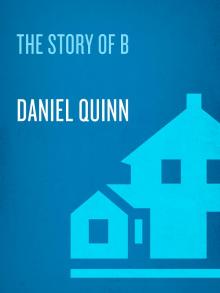 The Story of B
The Story of B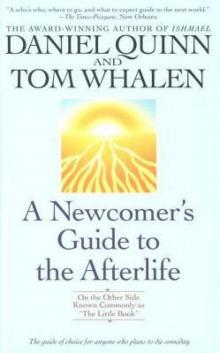 A Newcomer's Guide to the Afterlife: On the Other Side Known Commonly as the Little Book
A Newcomer's Guide to the Afterlife: On the Other Side Known Commonly as the Little Book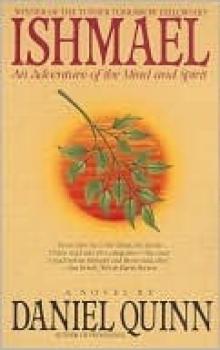 Ishmael: An Adventure of the Mind and Spirit
Ishmael: An Adventure of the Mind and Spirit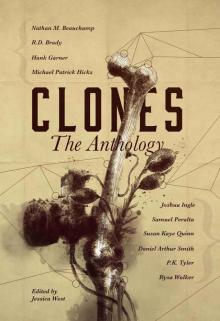 CLONES: The Anthology
CLONES: The Anthology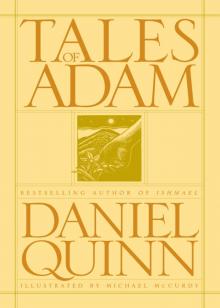 Tales of Adam
Tales of Adam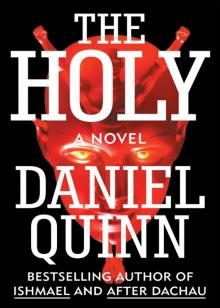 The Holy
The Holy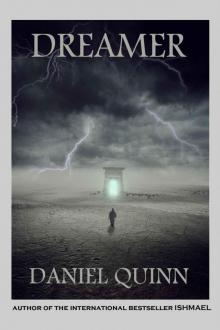 Dreamer
Dreamer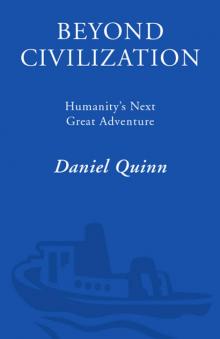 Beyond Civilization: Humanity's Next Great Adventure
Beyond Civilization: Humanity's Next Great Adventure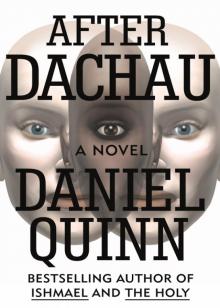 After Dachau
After Dachau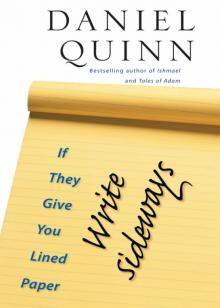 If They Give You Lined Paper, Write Sideways.
If They Give You Lined Paper, Write Sideways.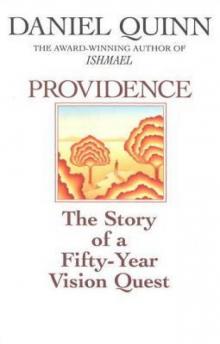 Providence
Providence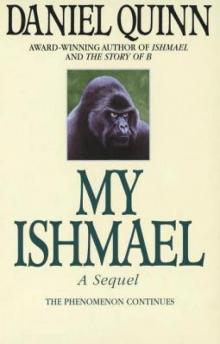 My Ishmael
My Ishmael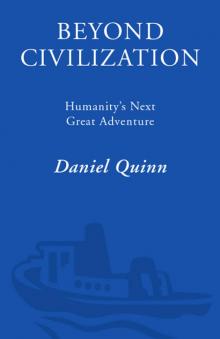 Beyond Civilization
Beyond Civilization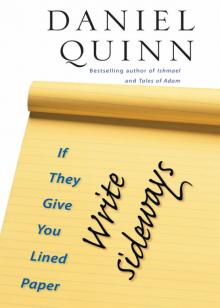 If They Give You Lined Paper, Write Sideways
If They Give You Lined Paper, Write Sideways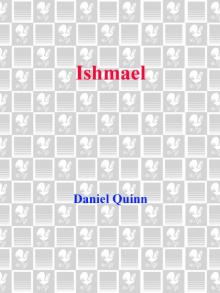 Ishmael
Ishmael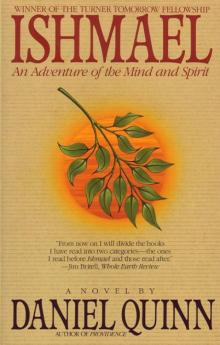 Ishmael i-1
Ishmael i-1 A Newcomer's Guide to the Afterlife
A Newcomer's Guide to the Afterlife